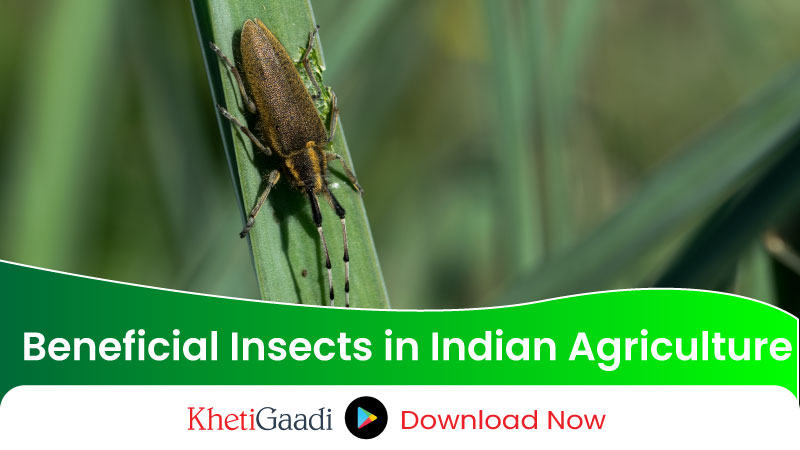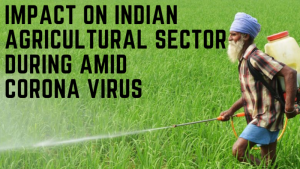A Solution for Sustainable Farming – Beneficial Insects
In Indian agriculture, the contribution of beneficial insects is both profound and indispensable. As India increasingly turns towards sustainable farming methods, the role of these insects becomes vital for ensuring food security, enhancing crop yields, and reducing dependence on chemical pesticides. Beneficial insects contribute to pest management, pollination, and soil health, playing a key role in the ecological balance of farmlands.
This blog will explore the various types of beneficial insects, their roles in agriculture, and how they contribute to sustainable farming practices in India.
List of Beneficial Insects in Indian Agriculture
There are various types of beneficial insects that play essential roles in Indian agriculture. Below are some of the most important:
- Ladybugs (Coccinellidae): Known for their voracious appetite for aphids, mites, and other pests, ladybugs are an asset in pest control.
- Bees (Apidae): One of the most important pollinators globally, bees contribute significantly to the production of various fruits and crops.
- Lacewings (Chrysopidae): Lacewings are excellent at controlling pests such as aphids, whiteflies, and mealybugs. The larvae of lacewings are particularly aggressive predators of these harmful insects.
- Parasitic Wasps (Ichneumonidae, Braconidae): These wasps lay their eggs inside or on other insect pests like caterpillars and aphids. Once the larvae hatch, they consume the host pest from the inside.
- Earthworms (Lumbricidae): Not an insect, but still highly beneficial. Earthworms contribute to soil aeration and the breakdown of organic matter, enriching the soil with nutrients and enhancing its fertility.
- Hoverflies (Syrphidae): Known as effective pollinators, hoverflies also feed on aphids during their larval stages, helping in natural pest control.
- Dragonflies (Anisoptera): These predatory insects are effective in controlling mosquito populations and other harmful pests in wetland areas.
- Predatory Mites (Phytoseiidae): These mites feed on harmful insects such as spider mites, thrips, and whiteflies.
Role and Importance in Indian Agriculture
Beneficial insects play multiple roles in agriculture. The two primary functions they serve are pest control and pollination.
- Pest Control
The greatest benefit of these is their role in natural pest control. Farmers traditionally rely on chemical pesticides to manage pests, but excessive use of such chemicals has harmful effects on the environment and human health. Beneficial insects, like ladybugs and parasitic wasps, provide a natural alternative by feeding on harmful pests such as aphids, caterpillars, and mites.
In India, pest control has been a significant issue due to the diverse climate and crops grown across the country. Pest attacks can destroy large portions of crops, leading to financial loss and food insecurity. However, using these to manage pests can reduce reliance on harmful chemicals while simultaneously improving crop yield and quality. They naturally regulate pest populations, thus reducing the need for expensive and environmentally damaging pesticides.
- Pollination
Another critical role of beneficial insects is pollination. Pollinators like bees, butterflies, and hoverflies contribute to about 75% of the world’s crop production. In India, crops such as tomatoes, apples, almonds, mustard, and cucumbers rely heavily on insect pollinators.
Pollinators help in the reproductive process of plants by transferring pollen from the male part of the flower to the female part, thus enabling fertilization. This process not only leads to the production of fruits and vegetables but also enhances the genetic diversity of plants, making them more resilient to environmental stressors.
How Beneficial Insects Contribute to Agriculture in India?
Beneficial insects offer numerous contributions to Indian agriculture, making them invaluable for sustainable farming. Here’s how they make a difference:
A. Integrated Pest Management (IPM)
Integrated Pest Management (IPM) is a holistic approach to pest control that utilizes beneficial insect to regulate pest populations. In India, many farmers are adopting IPM techniques to minimize the usage of synthetic pesticides. Beneficial insects serve as a cornerstone of IPM programs, contributing to healthier crops and reduced chemical inputs.
B. Soil Health and Fertility
Insects like earthworms and decomposer beetles play an essential role in enhancing soil health. Earthworms, in particular, improve soil structure by breaking down organic matter and recycling nutrients back into the soil. This increases the water-holding capacity of the soil and ensures the availability of essential nutrients for plants.
By improving soil health, these beneficial insects promote sustainable agriculture and increase crop productivity. In regions like the Indo-Gangetic plains, where soil health is deteriorating due to overuse of chemical fertilizers, promoting natural soil enhancers like earthworms can help revitalize farming.
C. Crop Yield and Quality
Farmers who utilize beneficial insects, especially pollinators, have seen substantial improvements in crop yield and quality. Studies in India have shown that crops like mustard, almonds, and cucumbers have up to 50% higher yields when pollinated by bees and other pollinators. Increased pollination also improves the quality of the produce, resulting in better market prices for farmers.
Sustainable Farming Practices Through Beneficial Insects
In India, sustainable farming practices are becoming more popular as farmers seek eco-friendly solutions to agriculture. Beneficial insects are at the forefront of this movement, helping farmers adopt greener and more sustainable methods.
A. Organic Farming
Organic farming, which avoids synthetic chemicals, naturally benefits from beneficial insects. Organic farmers in states like Kerala, Himachal Pradesh, and Sikkim use these for natural pest control and pollination. Organic certifications in India, like the Participatory Guarantee System (PGS), promote practices that encourage biodiversity, including the protection of beneficial insects.
B. Agroforestry and Crop Diversification
Agroforestry and crop diversification are two practices that support beneficial insects. When farmers plant a variety of crops, it provides a habitat for a broader range of beneficial insects. For example, hedgerows and wildflower strips within agricultural lands can attract pollinators and predatory insects, making farming systems more resilient.
Challenges and the Way Forward
While beneficial insects offer immense advantages, there are challenges to their widespread adoption in Indian agriculture.
A. Awareness and Education
Many farmers are unaware of the potential of beneficial insects and still rely heavily on chemical pesticides. Educational programs are needed to inform farmers about the role of these in sustainable farming.
B. Habitat Loss and Climate Change
Habitat loss due to deforestation, monoculture farming, and urbanization threatens the population of beneficial insects. Additionally, climate change is altering the habitats and life cycles of insects, which could reduce their effectiveness in pest control and pollination.
C. Government Support
Government policies in India are increasingly promoting natural and organic farming. However, more initiatives focusing on the conservation of beneficial insects, including subsidies for farmers using IPM and organic methods, can further boost their population and efficacy in agriculture.
Key Takeaways
- Beneficial insects like ladybugs, bees, and parasitic wasps play crucial roles in pest control and pollination in Indian agriculture.
- They contribute to sustainable farming practices by reducing the need for chemical pesticides and enhancing crop yields.
- Promoting these can help in improving soil health, supporting crop diversity, and boosting organic farming in India.
- Awareness, education, and government support are key to expanding the use of beneficial insects in Indian agriculture.
Relevant Links
- National Centre for Organic Farming (NCOF)
- Integrated Pest Management Techniques by NIPHM
- Role of Beneficial Insects in Organic Farming
- Directorate of Plant Protection, Quarantine & Storage
Tags




